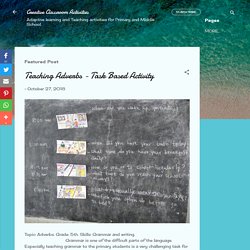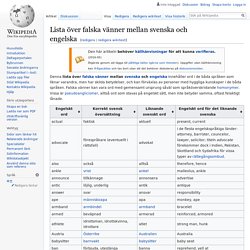

10 Ways to Improve Your English Vocabulary. The English language often lacks both rhyme and reason.

It’s full of synonyms, homophones, homonyms, and other confusing words that seem to make it especially difficult to learn. Luckily, you can use the same five skills to improve your English vocabulary as you did when learning your first language: reading, listening, writing, watching, and conversing. Write with fluency Be the best writer in the office.
Write with Grammarly Reading. Clarifying meaning. In one of the previous posts I presented some practical ways of revising and recycling vocabulary in class.

But, of course, before we get to the fun stage of revision games and activities, we need first to get the meaning of the new vocabulary item(s) across. And this is what I wanted to talk about in this post. The lexis that is taught in class can basically be divided into two categories: planned for (as part of our lesson aims)unplanned for or incidental (spontaneously arising from the in-class discussion) Whichever the case might be, we need to be able to clarify the meaning of new lexis in a way that ideally is:
Phrasal verbs. Collocations. Idioms. Linking words. Word Formation in English: Interpreting the Meaning of Prefixes and Suffixes. - learn English,words,english. Wordshake. : Vocabulary in EAP. An Engaging Word Game Helps Students Grasp Implicit Bias. As part of an effort to demonstrate the effect of implicit bias, library media specialist Jacquelyn Whiting devised an exercise that looks similar to “Mad Libs,” the popular fill-in-the-blank word game.

In EdSurge’s “Everyone Has Invisible Bias. Six collaborative games for competitive English language classrooms. Do you want your English language learners to work toward a common goal in the classroom?

Teacher David Petrie, who won the TeachingEnglish blog award , tells us his tried-and-tested methods. One of my favourite revision activities with my classes is 'backs to the board', also known as 'hotseat'. Revising and Consolidating Vocabulary: No-Prep Fun Strategies. Language Games for Teaching and Practicing Vocabulary. Topic: Language games Skill: Vocabulary Grade: Primary or Young Learners.

Learning a language requires a great deal of effort. Games help students to make and sustain the effort of learning. Mastermind. How to Increase Vocabulary - Studying English Vocabulary. Lista över falska vänner mellan svenska och engelska. Denna lista över falska vänner mellan svenska och engelska innehåller ord i de båda språken som liknar varandra, men har skilda betydelser, och kan förväxlas av personer med hyggliga kunskaper i de båda språken.

Ten ways to learn new words as a language learner. Teacher and teacher trainer Svetlana Kandybovich, our latest TeachingEnglish blog award winner, shares her top tips for remembering new words.

As a language learner, you work hard to expand your vocabulary. You plough through new words every day, make long lists of words and practise with flashcards. However, when it comes to speaking, the new words seem to fall out of your head, so you resort to your old friends – words you already know and have used many times – again and again. Remembering and using new words in speech is often a challenge for language learners. Perfect Ways to Start/Maintain a Conversation in English - learn English,communication,english,vocabulary,sentence,starts. Most-misused-phrases-words-english-language-uk-revealed-to-be-pacific-a8098791. New research has revealed the 30 most commonly misused phrases in the UK.

Known as eggcorns, the bizarre phrases often carry entirely different – and often hilariously nonsensical – meanings. Scrivens Opticians & Hearing Care surveyed 2,000 British adults and found that 35 per cent of them used eggcorns without even realising they were saying something incorrectly. Common examples of eggcorns include: “curve your enthusiasm” (instead of “curb"), “escape goat” (instead of “scapegoat”) and “biting my time” (instead of “biding”), reports The Sun. Still unsure as to whether you are an eggcorn user or not? Well, consider this: when was the last time you nipped it in the butt? Alexander Skarsgård Teaches You Swedish Slang. Precious Oyetayo Subuloye - THIS IS POWERFUL!!!!! Highly delighted, bitterly disappointed, ridiculously cheap: adverbs for emphasis. [by Liz Walter] We often make adjectives stronger by putting an adverb in front of them.

The most common ones are very and, for a stronger meaning, extremely: He was very pleased. The ship is extremely large. Word Formation in English: Interpreting the Meaning of Prefixes and Suffixes. - learn English,words,english. Synonyms Thesaurus With Definitions and Antonyms. LearnEnglish – British Council - 10 ways to learn new words. Worksheet-free Vocab Revision Activities – Clare's ELT Compendium. What do you do in those last 5 minutes of class when you’ve finished everything that was planned?

Or when energy levels hit a low during a lesson? Or in that lull while the next student gets ready to present, or whatever? We all know about the need to revise and recycle new vocabulary in language lessons, and in this post I want to share a few vocabulary revision activities that teachers can slot into any downtime that might occur in a lesson! I’ve built up my repertoire of this kind of quick review activity over the years, so many are borrowed or adapted from colleagues, and others are based on popular board games.
I want to give you a collection, all in one place, of collaborative and competitive activities that check students have remembered and actually understood new words (i.e. there are no rote learning activities here!) 1. Webbovningar.nok. What is a malaphor? It's not rocket surgery! Have you ever mixed up your idioms and come out with something slightly… odd? Maybe you meant to comment on the relative trustworthiness of an acquaintance, but instead of saying ‘I wouldn’t trust him as far as I could throw him’ – i.e. not even a little – you crossed this with ‘I wouldn’t touch him with a bargepole’, and ended up telling the world at large that you ‘wouldn’t trust him with a bargepole’.
An altogether different kettle of worms. But while your newly coined expression may technically be incorrect, it still manages to get your point across; if you don’t trust him even a little, why would you trust him with bargepole? This phenomenon of mixing idioms has a name and it’s called a malaphor. Four games for vocabulary development. In this post, we’ll share four classroom games that we also find effective in teaching vocabulary to English Language Learners. Nine Box Grid We use this simple game, which we learned and modified from English teacher Katie Toppel, a lot. As you can see from the image, it’s just a matter of putting nine words (or, when we teach phonics, letters) on a numbered three-by-three grid (for a total of nine boxes/spaces) on the class whiteboard.
Then, we give students mini-whiteboards (sometimes they play with a partner and sometimes individually), markers, and erasers/cloths (if you haven’t invested in a class set of mini-whiteboards, we’d strongly advise you do so - either buying them from a store or making your own – search “make mini-whiteboards” online for instructions). Next, we take out two huge foam dice we bought online for a few dollars. Then, another student rolls the dice and the game continues. American English at State - Photos. Your base vocabulary: Your first 400 English words. - learn English,words,communication,english,vocabulary,pronunciation. Ways to avoid using the word 'very'. Synonyms for very. - learn English,communication,english.
Quiz: American phrases to confuse Brits - OxfordWords blog. Intensifiers in English - learn English,grammar,french. One way to introduce a new vocab set. This is a different way to introduce a new vocab set to introduce to your students. I learnt it from my tutor on my CELTA course. I used it recently with my 11-year-olds and it worked really well. I think it would work with older students and higher levels too. They get a chance to strengthen their own knowledge with a bit of peer teaching and they can physically chart their learning. Start by asking your students to take a piece of paper and divide it into 3 sections: I knowI’m not sureI don’t know Then explain that you’re going to read some words out. Then read out the words slowly, repeating each one until everyone has written it down in one of the boxes. Now you can ask the students to work together in twos or threes to share their knowledge. Lastly, you can go through each one by eliciting what each word means and writing it on the board.
Share this with other teachers: 7 Swedish words that English speakers shouldn’t be confused about – Student blogs from Karolinska Institutet. As an expat in Sweden (although I do speak Swedish), I sometimes find it difficult not to laugh at some of the Swedish words that have the exact same spelling of English words, but mean something extremely different. Amazingly enough, some of these words are so commonly used that you can almost hear or read them many times a day.
Here’s a list of 7 words that I think English speaking people shouldn’t be confused about when they come to Sweden. English Vocabulary in Use: Advanced - Expressing feelings with idioms. mELTing Activities, Lessons and Ideas: Gradients of meaning. Here's another activity linked to Am I Small? If you have your own classroom here's a fun bulletin board project! Give each student a a paint strip (you can get them for free from your local hardware store: Home Depot, Lowes, etc.) Paint strips have recently gained popularity in crafting and are no longer used as samples. As a result some stores are charging. Rather than take the samples from the paint display, ask the manager if they have any expiring paints that you could grab the sample sticks for when they expire. Once you found your paint strips, write a "boring" adjective on the bottom (the lightest color) then have them choose their own adjectives that mean the same (or similar) but are more powerful.
You can use the story as an example and make a couple sample paint strips using the words from the story. mELTing Activities, Lessons and Ideas: Get Students Using Different Words. In fifth grade my teacher Ms. Sipe outlawed “four letter words.” She wasn’t referring to swearing; she didn’t want us to use words like: good, nice, or tall. She thought we could use better words: noble, pleasant, or towering. Why? Because these specific words gave us a better idea of what we were describing. This is also very useful when students start paraphrasing something that is useful for many reasons. Many of our students need help to get out of a vocabulary rut. 'You're having a giraffe!?' A starter guide to UK slang. Are you moving to the UK for study or work? The British Council's Sophie Cannon explains some of the weird and wonderful words and phrases you might encounter. How do you record and review new... - LearnEnglish Teens – British Council.
Making Vocabulary Stick: a Fun Game to Make New Terms Stick. Intensifiers in English - learn English,grammar,french. Six low-preparation vocabulary activities for the English classroom. Check out Cristina Cabal’s ‘Nine ways to... - TeachingEnglish - British Council. Useful Phrases: Opening, Continuing, Opinion, Contrasting, Agreement, Disagreement, Emphasizing etc. - learn English,vocabulary,communication,english. Word's to Describe Tone, Attitude, and Mood - Inspiration for Your Writing - learn English,english,words,tone,writing,describe. Improve and expand your vocabulary. When you don’t know an exact word. - learn English,vocabulary,english. English Vocabulary. Where do new words come from? - Marcel Danesi. Find the creation of new words fascinating?
Click here to find out more. How new words are born is a great article on this topic. Loanwords are those words borrowed from another language. Here is a site with some great examples found in the English language. Video Lesson: Mr. Bean – Tim's Free English Lesson Plans. Follow me on twitter Just a quick note… Before you use these materials… We’ve created a new podcast aimed at B2+ level English students and teachers alike. You can listen for free at our SoundCloud page below. We have released 5 episodes so far and you can download teacher’s notes to accompany them from our Facebook page or from this blog.
WeAreTeachers — Love this chart of wonderful words. ... Flashcards. Finding New Ways to Say Something. - learn English,communication,english,vocabulary. 66 Facts You May Not Have Known About The English Language. Language Learning Base. How to Play the Game of Taboo: 13 Steps. Edit Article Three Parts:Starting the GamePlaying Each RoundGaining an Edge on Your OpponentsCommunity Q&A Taboo is a classic card game, released by Hasbro in 1989.
The goal is to get your teammates to guess the word you are describing, but there’s a list of words you can’t say. You’ll want to divide teams evenly, get the cards ready, and have a timer. FCE PREPOSITIONS. Love British Slang? Then you’ll love these 12 expressions. If you haven't tried it yet, don't miss... - LearnEnglish – British Council. Say the Same Thing – TeachingGamesEFL.com – by Mike Astbury. I first saw this video last year, but I was reminded of it at the weekend thanks to Lisko MacMillan who used it as part of her excellent session at the Teacher Training day in Torun. Watch the first minute or so to see the game in action: There’s not much to it: Count to three and say a word (any word at all) at the same time as your partner.Count to three again and try to say a word or phrase that is in the middle of the two different words you said.You repeat until you say the same thing.
It’s a very simple game and it’s easy to demonstrate and to play with students. Play the game as above but students start the game using words from a lexical set, either as revision of something from a previous lesson or as a fun way to produce/drill some new language. mELTing Activities, Lessons and Ideas: Multiple Meanings of a Words. My friend is small. What do I mean by that? Is she skinny? Very Good Words That Are Very Capable of Replacing “Very” - learn English,vocabulary,very,english. 5 cartoons of confused words. Seven steps to vocabulary learning. UK slang for international students. Tables. Mind maps. Word cards. Spelling quiz – hard. Learn Useful Expressions in English. Vocabulary and autonomy. Snack facts - recording vocabulary. How To Speak British - Anglophenia Ep 7. Online English Vocabulary Size Test.
Quizzes to Test Your English Vocabulary. Thesaurus. Question words with the verb to be. 66 Facts You May Not Have Known About The English Language. Know your Latin: i.e. vs. e.g. Games With Words: Which English? IB English B: Related Conditional phrases. Vocabulary. Lingro -The smart dicitionary. One way to introduce a new vocab set. Glosförhör - bara om vi lär oss - Mia Smith. There is no such thing as a true synonym in English. Discuss! Untitled. Commonly confused words: Compliment vs. Complement, Fewer vs. Less, Loose vs. Lose, Than vs. Then etc. - learn English,words,mistakes,english.
Best ways to memorize English words - learn English,vocabulary,english. Understand what you read. How Many English Words Do You Actually Know? WORD GAMES. Photos du journal - Teaching English – British Council. Presenting vocabulary. Intensifiers in English - learn English,grammar,french. LearnEnglish – British Council. All Things Topics - Home. Complex prepositions. Definition and Examples. - learn English,preposition,grammar. Fun or Funny? Learn English with Simple English Videos.